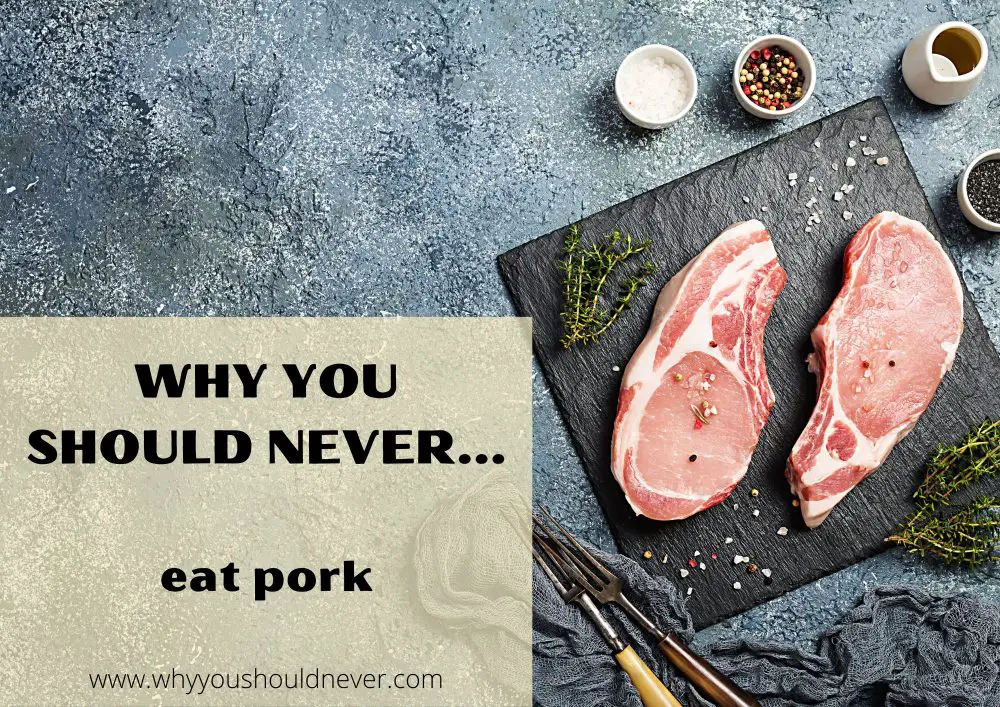![]()
Why You Should Never Eat Pork
Sausages, bacon, and ham are all popular pork products. And with good reason: they’re delicious! There’s nothing quite like starting your day with a juicy bacon sandwich or enjoying a delicious plate of ham and eggs.
But as with most things that taste great, there’s a downside to eating pork. Pork is, in fact, one of the unhealthiest meats you can eat. In this article, we’re going to discuss why you should seriously consider cutting pork out of your diet altogether.
9 reasons why you shouldn’t eat pork
1. Pork contains parasites
One of the main reasons why you shouldn’t eat pork is because it contains parasites. These parasites can cause disease and even death in humans.
Some of the most common parasites found in pork include roundworms, tapeworms, and trichinosis. Trichinosis is a worm infection that can be passed on to humans from pigs. This infection can cause fever, diarrhea, vomiting, and muscle pain. In severe cases, it can also lead to death.
While cooking pork may kill some of the parasites, it won’t remove all of them.
2. Pork may cause cancer
Another reason to avoid eating pork is that it may contribute to cancer. Pork products contain heterocyclic amines (HCAs) and polycyclic aromatic hydrocarbons (PAHs).
These are both carcinogenic (cancer-causing) compounds that have been linked to an increased risk of various types of cancer, including stomach, colon, and pancreatic cancer.
3. Eating pork can lead to allergies
Some people are allergic to the protein found in pigs. These proteins include pork insulin and pork trypsinogen.
Pork insulin is similar to human insulin and can cause an allergic reaction in some people. Pork trypsinogen is a protein that helps the pig digest its food. This protein has also been known to cause allergic reactions in humans.
4. Pig farming is harmful to the environment
Pig farming is one of the most damaging types of farming to the environment. Pigs produce large amounts of manure, which contains nitrogen and phosphorus.
These substances can pollute the air, water, and soil. In addition, pig farms often use large amounts of antibiotics, which can lead to the development of antibiotic-resistant bacteria. These antibiotics tend to leach into the environment and can contaminate water sources and the earth.
5. Pigs are generally left in unsanitary conditions
Pigs are intelligent animals that can feel pain and suffering. Unfortunately, they’re often kept in unsanitary conditions on factory farms.
These farms confine pigs to small metal cages or pens. The floors of these pens are often slatted, so the waste falls through into a pit below. The pigs are cramped and have no room to move around or exercise.
The conditions on these farms are so bad that pigs often develop sores and ulcers. They also, believe it or not, suffer from anxiety, boredom, and depression.
6. Pigs eat other animals
There’s a somewhat unspoken rule that humans should avoid eating animals that eat other animals. Pigs are one of the few exceptions to this rule.
Pigs are omnivores, which means they’ll eat just about anything. This includes dead animals, feces, and even their own young. As a result, pigs can harbor all sorts of diseases and parasites.
Thus, whatever they eat, you end up eating too.
7. Pork is loaded with saturated fat
If you’re trying to eat a healthy diet and/or watch your weight, you should avoid eating pork. Pork is loaded with saturated fat, which can raise your cholesterol levels and contribute to heart disease.
In addition, pork is also high in calories, which can cause weight gain. You only need to look at a slice of bacon to see how much fat it contains.
8. Pork is often processed
Much of the pork that’s sold in stores is processed. This means it’s been treated with chemicals and preservatives to extend its shelf life.
Processed pork products include ham, bacon, sausages, and hot dogs. These products are often high in salt, sugar, and fat. They can also contain harmful additives and preservatives, such as sodium nitrite.
If you take a look at the pork content in many of these products, you’ll also notice how low the percentage actually is; the rest is made up of water, fat, and other fillers.
9. You can get food poisoning from eating pork
As with any type of meat, there’s a risk of food poisoning if you eat pork that isn’t cooked properly. Pork can harbor bacteria, including Salmonella, Listeria, and E. coli.
These bacteria can cause food poisoning, which can lead to symptoms like nausea, vomiting, diarrhea, and fever. If you eat pork that’s been contaminated with these bacteria, you could end up in the hospital.
Conclusion
If there was ever a food to avoid, pork would be it! For all of the reasons listed above, pork is not something you should be eating. It’s unhealthy, it’s harmful to the environment, and it can make you very sick.
If you simply must eat meat, there are better options out there. Chicken, fish, and lamb are all much healthier for you and the planet.
